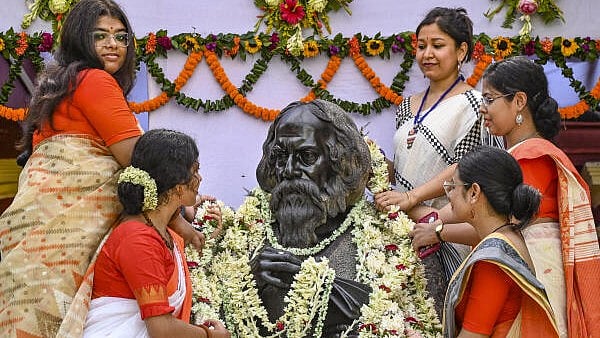
File photo of students paying tribute to Nobel laureate Rabindra Nath Tagore. (Representative image)
Credit: PTI Photo
New Delhi: India on Thursday strongly condemned the vandalisation of the ancestral home of Gurudev Rabindranath Tagore in Bangladesh, noting that the incident was the latest in a series of attempts by extremists to erase the symbols of tolerance in the neighbouring country.
The ‘Kachari Bari’ of the family of Rabindranath Tagore at Sirajganj in Bangladesh was vandalised by a mob on June 8. New Delhi, however, condemned the incident on Thursday, a day after the head of the interim government in Dhaka, Muhammad Yunus, at an event in Chatham House in London, criticised Prime Minister Narendra Modi for not acting on his request to stop Bangladesh’s former prime minister, Sheikh Hasina, from virtually addressing people in her country from India.
“We strongly condemn the despicable attack and vandalisation of the ancestral home of Gurudev Rabindranath Tagore by a mob,” Randhir Jaiswal, the spokesperson of the Ministry of External Affairs, said, adding: “The violent act is a disgrace to the memory and the inclusive philosophy and teachings that the Nobel Laureate espoused in Bangladesh.”
Though Tagore was born in Kolkata, his family had estates across Bengal, then an undivided province of India ruled by the British Raj. He created many of his literary works while living at the Kachari Bari in Sirajganj in what came to be known as East Pakistan in 1947 and Bangladesh in 1971. The songs written by him were later adopted by both India and Bangladesh as the national anthems.
The Rabindra Kachari Bari, now a museum dedicated to the polymath, came under attack from an irate mob following an altercation between a visitor and a member of the staff over the parking fee. The mob vandalised the auditorium of the Kachari Bari and assaulted the director of the museum.
“The attack falls in the broad pattern of systematic attempts by extremists to erase the symbols of tolerance and eviscerate the syncretic culture and the cultural legacy of Bangladesh,” Jaiswal said, conveying the condemnation of India.
“We urge the interim government to rein in the extremists and take strict action against the perpetrators to prevent recurrence of such incidents that, sadly, have become a repetitive feature,” added the MEA spokesperson.
West Bengal chief minister and the Trinamool Congress supremo, Mamata Banerjee, also wrote to Prime Minister Narendra Modi, urging him to initiate “immediate and strong diplomatic engagement” with the government of Bangladesh.
“The shocking vandalism of Kobiguru’s ancestral home in Sirajganj, Bangladesh, is an act of sheer barbarism that has deeply wounded the sentiments of millions. This is not merely the defacement of a structure but a direct assault on our shared cultural heritage and the timeless ideals Tagore stood for. Such desecration cannot and must not be ignored,” she wrote on X.
She demanded that the perpetrators be swiftly identified and brought to justice, and firm steps must be taken to safeguard all sites of cultural and historical significance from such future violations. “Bengal will not tolerate any insult to its icons anywhere in the world,” Banerjee posted on the social media platform.
